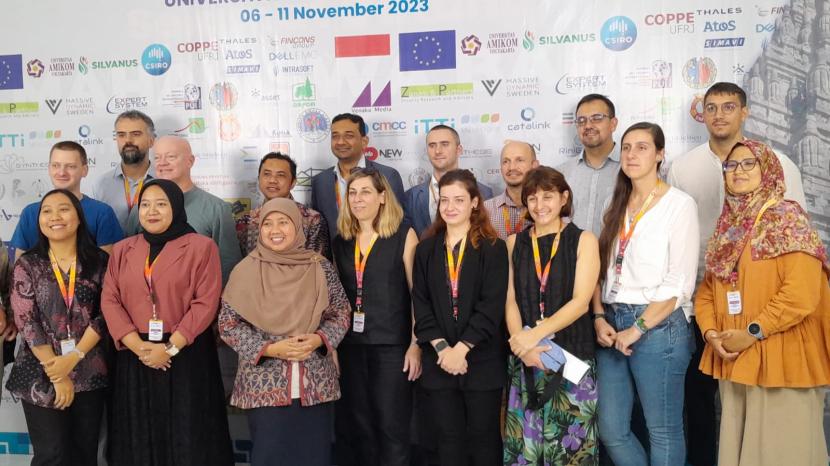REPUBLIKA.CO.ID, SLEMAN -- The University of Amikom Yogyakarta designs technology for forest fire management, as part of the Silvanus project. Silvanus is an international consortium involving 49 institutions from 18 countries, of which 15 countries are in Europe and the other three are Indonesia, Brazil, and Australia.
Postgraduate Director of The University of Amikom, Kusrini, said this consortium is working on a collaborative project to build an integrated system for managing forest fires. This collaborative project in building an integrated system related to forest fire management will be carried out for four years, from October 2021 to March 2025. In Indonesia, the forest used as a pilot project is the peat forest of Sebangau National Park, Palangka Raya, Central Kalimantan.
"This is actually in the middle of the project, we already have a design (technology) although it is not yet perfect. This is finally what we presented yesterday, we showed it to them (the consortium) and we want feedback, whether this is in accordance with what is needed in Indonesia or are there other things more specifics need to be added," said Kusrini during The Silvanus Indonesia Pilot Visit 2023 agenda at University of Amikom, Yogyakarta, Friday (10/11/2023) evening.
Kusrini explained that Sebangau National Park was made into a pilot project because it is one of the largest peat forests in Indonesia. The forests managed by the government, said Kusrini, are a representation of and one of Indonesia's natural resources.
"The largest forest in Indonesia is a peat forest, where these peat forests have extraordinary power in that they can absorb 20 to 80 times more carbon than ordinary forests, so this has become one of Indonesia's riches. Why is it there (Sebangau)? Because this is one of the areas managed by the government, so it is representative, the data is there, then we can also invite cooperation," he explained.
Representatives from several institutions involved in the Silvanus project have also visited Sebangau National Park as a forest that is a pilot project. The visit was carried out on November 7 2023. Kusrini said that the visit to Sebangau National Park was carried out to see the condition of forest fires in the area, and learn what forest fire management is like. Apart from that, this visit also aims to find out what is needed in forest management.
"Yesterday we went to Sebangau to see what the forest landscape in Indonesia is like, which should be very different from that in Europe. We visited the forest to find out the needs, apart from seeing the place and also to meet the community. We want to know what Indonesia needs to manage fires forests, so that this consortium can help provide appropriate technology," said Kusrini.
"This visit aims to see the real conditions in the field, so that the right solution can be created, and we will also present the prototype (technology) that we have so that we can then get feedback," he added.
It is hoped that the visit will not only produce technology for the countries involved in the Silvanus project in managing forest fires. However, it is also hoped that this visit can become best practices for each country in managing its forests.
Moreover, the condition of forest fires in Indonesia is also quite high, especially during the El Nino period, which occurs on average once every four years. In Sebangau, she said, massive forest fires occurred during El Nino in 2015, and again in 2019.
In 2023, it is also predicted that massive forest fires will occur, but the impact can be reduced. According to Kusrini, anticipating the impact of forest fires can be a good example for countries involved in the Silvanus project.
"It is predicted that this year will also be the same (there will be forest fires), but thank God the government's program to anticipate this has been extraordinary, so the impact can be reduced. This is a good example that we can tell from Indonesia to our friends in this consortium, so that could be the best practice for how Indonesia manages forest fires," he said.
Scientific Manager of the Silvanus Project from Germany, Krishna Chandramouli, said that this project was funded by the European Commission worth 24 million Euros or the equivalent of around Rp 400 billion. From his visit to Sebangau, Krishna said that the forest was very representative for studying how to manage forest fires. This is also in order to study the current climate change problem.
"Sebangau is a very large and extraordinary forest, something good for us to learn. It is a good thing that we come here to learn, and can share knowledge with pilot projects in other countries. We can share knowledge, and we have 12 pilots projects in 11 countries," said Krishna.
From the Silvanus project, it is said that the main result or output is the launch of a forest management platform that is resilient to climate change in order to prevent and extinguish forest fires. Silvanus relies on environmental, technical and social science experts to support regional and national authorities responsible for forest fire management in their respective countries.
Silvanus research scientists and engineers, he said, will help civil protection authorities to monitor forest resources efficiently. including evaluating biodiversity, producing more accurate fire risk indicators, and promoting safety regulations among local residents affected by forest fires through awareness campaigns.


